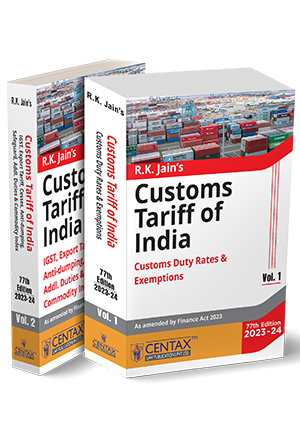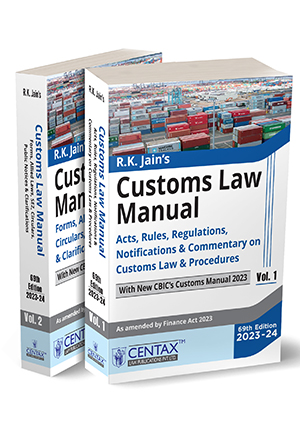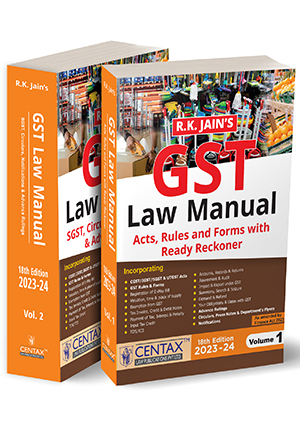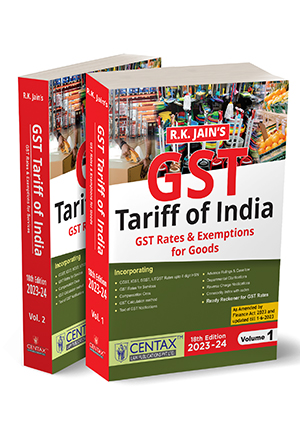[World Tax News] Australia Allows Temporary Relief from Accounting of Deferred Taxes Arising Due to Pillar 2 and More
- Blog|International Tax|
- 3 Min Read
- By Taxmann
- |
- Last Updated on 26 July, 2023
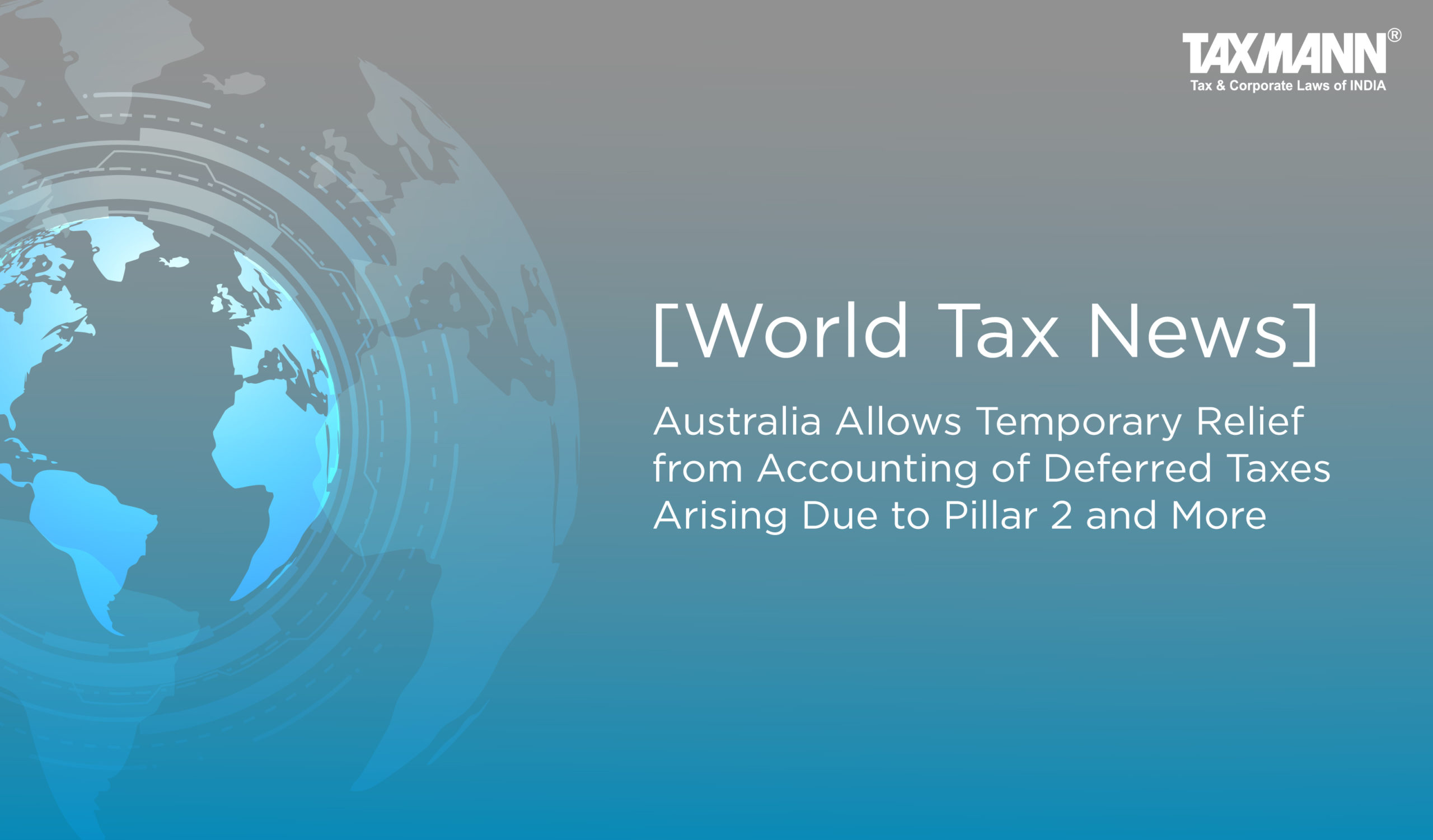
Editorial Team – [2023] 152 taxmann.com 313 (Article)
World Tax News provides a weekly snippet of tax news from around the globe. Here is a glimpse of the tax happening in the world this week.
1. Australia allows temporary relief from Accounting of Deferred Taxes arising from Pillar 2
The Australian Accounting Standards Board (AASB) has released amendments to Australian Accounting Standards. These amendments offer temporary exemptions for accounting for deferred taxes resulting from Pillar 2 of the OECD’s international tax reform, along with specific disclosure requirements.
These amendments were prompted by the AASB’s issuance of temporary relief provisions for deferred tax accounting in May 2023. The AASB has additionally declared corresponding amendments for disclosure obligations applicable to Tier 2 entities.
The amendments will introduce:
(a) A mandatory temporary exemption for accounting of deferred taxes arising from the implementation of the Pillar Two model rules published by the OECD; and
(b) Targeted disclosure requirements to help financial statement users better understand an entity’s exposure to income taxes arising from the reform.
This Standard applies to annual periods beginning on or after January 01, 2023 that end on or after June 30 2023.
Source: AASB 2023-2
2. Switzerland to extend carry forward of losses from 7 years to 10 years after COVID-19 period
The Swiss Federal Council has announced that Parliament is reviewing a proposal to extend the period for carrying forward of losses from 7 years to 10 years. This measure intends to support companies affected by the COVID-19 pandemic in resuming their operations.
It applies to all companies, including losses incurred by permanent establishments and losses incurred by self-employed individuals. Transitional provisions stipulate that the previous law, which had a 7-year limit, will continue to apply to losses incurred before the 2020 tax period.
The proposal is open for consultation and will conclude on October 19, 2023.
Reference: Extension of the loss compensation period
3. BEPS Monitoring Group calls developing nations to respond proactively to the Global Minimum Tax introduced under Pillar 2
A briefing has been published by the BEPS Monitoring Group, which examines the results of the most recent stage of the G20/OECD initiative on base erosion and profit shifting (BEPS), known as the two-pillar solution.
The briefing summarises the likely outcomes of the latest negotiations on the reform of rules for taxing multinational enterprises (MNEs). It outlines options for measures to be considered in response, especially by developing countries.
The mandate for the G20/OECD project on base erosion and profit shifting (BEPS) was to ensure taxation of MNEs ‘where their activities take place’.
The Two-Pillar package of proposals agreed upon in 2021 entailed acceptance in principle of this approach, and the technical work since then has established detailed standards for its implementation. However, the four specific measures proposed are much more limited and would be ineffective and unfair, especially for developing countries. It is essential that these countries adopt alternatives more appropriate for defending their source tax base, which can also be compatible with the BEPS package.
Estimates show that most developing countries would gain little or no additional tax revenue directly from the global minimum tax (GloBE), and since its rules are highly complex, joining the scheme would not be cost-effective for most of these countries. Implementation of the GloBE could nevertheless benefit all countries, putting a partial brake on the competition to reduce tax on MNEs to attract investment, although there is a danger that the 15% minimum could become the maximum.
The developing countries should:
(i) Review all their existing tax incentives and remove them unless there is clear evidence of benefits to the country’s economy; and
(ii) Introduce appropriate measures to protect their right to tax profits at source, which would be more effective than the DMTT, under which countries are not able to tax profits that have been shifted out of their jurisdiction.
Such measures can be carefully designed to be compatible with the (GloBE), and with international obligations, including tax treaties, although this may entail negotiations with treaty partners due to differences in interpretation. While states should individually design measures suited to their own circumstances, they can learn from each other to achieve convergence and develop a common approach through appropriate regional and sectional organisations.
The aim should be to prevent the continuation and exacerbation of the present unfair and ineffective approach and to maintain the momentum towards a more comprehensive reform. This should be based, as already signposted by the G-24, on unitary taxation of MNEs with formulary apportionment. This could finally benefit all countries and MNEs by establishing a simple, effective, fair system for MNE taxation.
Disclaimer: The content/information published on the website is only for general information of the user and shall not be construed as legal advice. While the Taxmann has exercised reasonable efforts to ensure the veracity of information/content published, Taxmann shall be under no liability in any manner whatsoever for incorrect information, if any.

Taxmann Publications has a dedicated in-house Research & Editorial Team. This team consists of a team of Chartered Accountants, Company Secretaries, and Lawyers. This team works under the guidance and supervision of editor-in-chief Mr Rakesh Bhargava.
The Research and Editorial Team is responsible for developing reliable and accurate content for the readers. The team follows the six-sigma approach to achieve the benchmark of zero error in its publications and research platforms. The team ensures that the following publication guidelines are thoroughly followed while developing the content:
- The statutory material is obtained only from the authorized and reliable sources
- All the latest developments in the judicial and legislative fields are covered
- Prepare the analytical write-ups on current, controversial, and important issues to help the readers to understand the concept and its implications
- Every content published by Taxmann is complete, accurate and lucid
- All evidence-based statements are supported with proper reference to Section, Circular No., Notification No. or citations
- The golden rules of grammar, style and consistency are thoroughly followed
- Font and size that’s easy to read and remain consistent across all imprint and digital publications are applied

